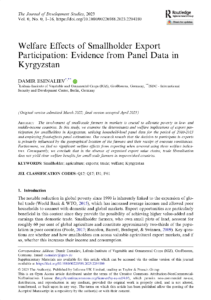The involvement of small-scale farmers in markets is crucial to alleviate poverty in low- and middle-income countries. In this study, we examine the determinants and welfare implications of export participation for smallholders in Kyrgyzstan, utilising household-level panel data for the period of 2010-2013 and employing fixed-effects panel estimations. Our research reveals that the decision to participate in exports is primarily influenced by the geographical location of the farmers and their receipt of overseas remittances. Furthermore, we find no significant welfare effects from exporting when assessed using three welfare indicators. Consequently, we conclude that in the absence of organised export value chains, trade liberalisation does not yield clear welfare benefits for small-scale farmers in impoverished countries.
Publication Details
- Region/s: Central Asia
- Theme/s: Human Development · Life in Kyrgyzstan · Micro-Data Collection
- Research Topic/s: Agriculture · Institutions & Fragility · Poverty & Inequality
- DOI: https://doi.org/10.1080/00220388.2023.2204180




